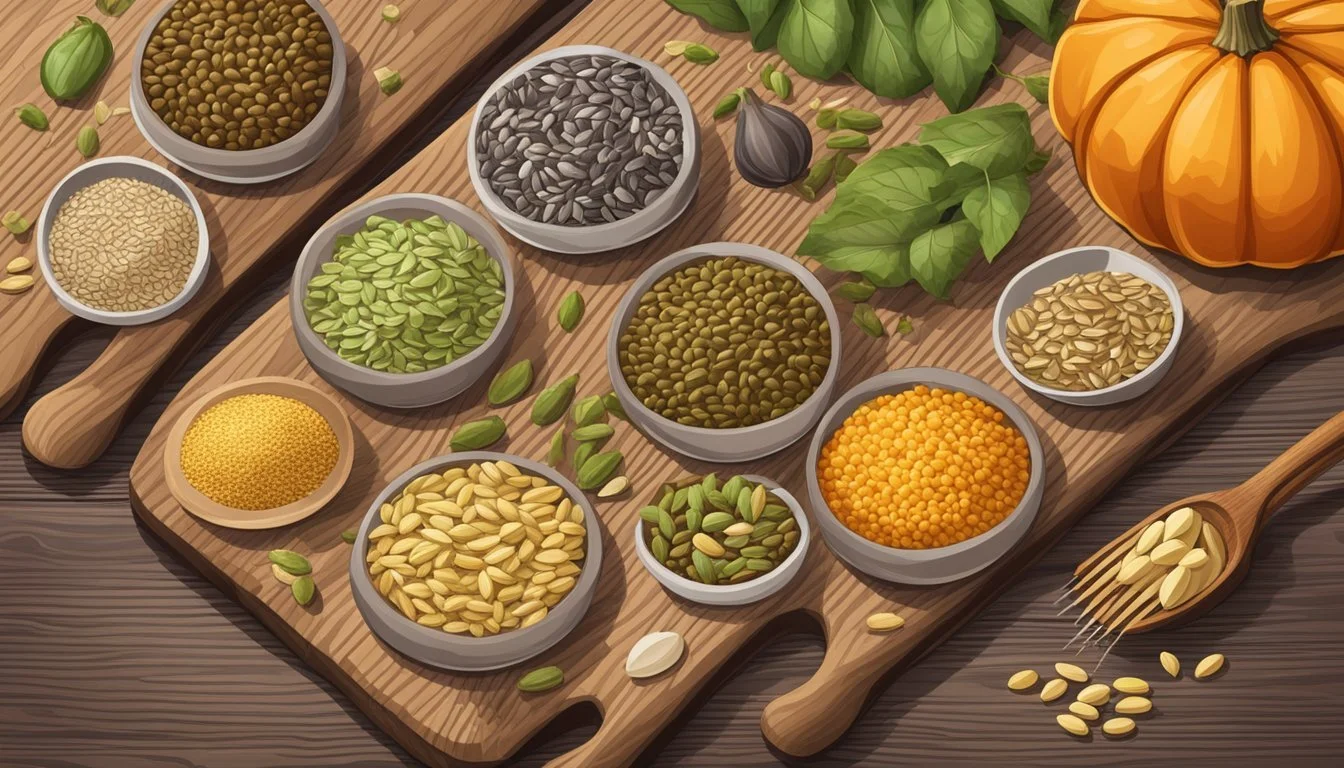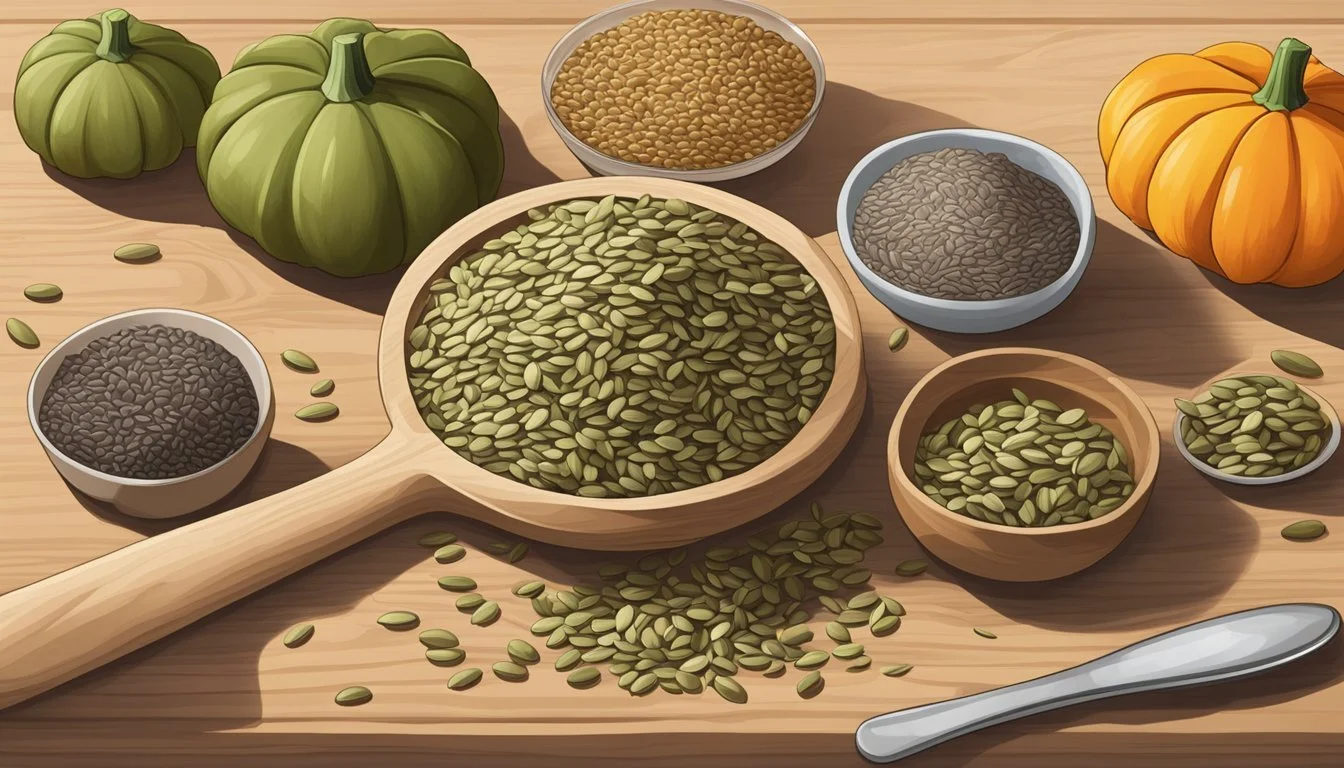Pumpkin Seed Substitutes
Top Alternatives for Your Recipes
Pumpkin seeds, known for their crunchy texture and nutty flavor, are a popular ingredient in a variety of dishes, ranging from salads to baked goods. However, when pumpkin seeds are unavailable or unsuitable for certain dietary preferences, finding an alternative that closely mimics their characteristics becomes necessary. This has led to an exploration of various pumpkin seed substitutes that can offer similar benefits and maintain the integrity of the original recipe.
Several seeds and nuts can stand in as appropriate substitutes for pumpkin seeds in culinary applications. Sunflower seeds are often favored for their comparable size and taste, providing the same satisfying crunch one expects from pumpkin seeds. Sesame seeds bring a touch of sweetness that can enhance salads and baked products, while chia seeds introduce a unique texture that is particularly beneficial in health-focused recipes. For those seeking a similar nutritional profile, flaxseeds are an excellent alternative, offering a subtle flavor along with an array of health benefits.
Why Substitute Pumpkin Seeds?
Choosing substitutes for pumpkin seeds can depend on a variety of factors, including nutritional preferences, allergies, and product availability during certain times of the year. The following subsections address these considerations in detail.
Nutritional Considerations
Pumpkin seeds are renowned for their nutritional benefits, boasting a significant amount of protein, fiber, and minerals such as magnesium, zinc, and iron. When substituting them, it's important for individuals to consider that potential replacements should ideally match these benefits. Sunflower seeds, for instance, provide a similar nutrient profile with an emphasis on vitamin E, which is key for skin health and immune function.
Nutritional benefits to consider in substitutes:
Protein content for muscle repair and building
Fiber for digestive health
Essential minerals for various bodily functions
Allergies and Dietary Restrictions
Pumpkin seeds can be allergenic to some individuals, necessitating a safe alternative. Moreover, certain dietary restrictions might preclude the use of pumpkin seeds. For those looking for a substitute, seeds such as sunflower or chia can offer a solution, as they are less commonly associated with allergies, though it is always important to consult with a healthcare professional.
Concerns to note:
Allergy potential of the substitute
Compatibility with dietary restrictions (e.g., gluten-free, nut-free)
Availability and Seasonality
While pumpkin seeds are often readily available in the fall, their off-season accessibility might be limited, prompting individuals to seek substitutes. Seeds like sesame, sunflower, and flaxseeds not only provide a similar crunch and flavor profile but are also typically easier to find throughout the year.
Factors influencing substitute choice:
Seasonal availability of pumpkin seeds
Year-round availability of alternative seeds
Nutritional Value of Pumpkin Seeds
Pumpkin seeds are a powerhouse of nutrients, providing not only a pleasant crunch but also essential vitamins and minerals. They are an excellent source of plant-based protein, beneficial fats, and dietary fiber.
Macro and Micronutrients
Pumpkin seeds are a rich source of protein and dietary fiber. They contain about 5.5 grams of fat and offer a substantial amount of protein, with values fluctuating around 6 grams per one-ounce serving. These seeds are also packed with micronutrients, prominently featuring magnesium, iron, and zinc — minerals that support various bodily functions including immune response and bone health.
Vitamins and Minerals Content
In addition to their macro profile, pumpkin seeds have a robust vitamin and mineral content. They are particularly high in magnesium, one of the key minerals essential for many bodily processes such as muscle and nerve function. The seeds also provide valuable amounts of iron, necessary for oxygen transport in the blood, zinc for immunity and skin health, and a noteworthy content of calcium.
Beneficial Fats and Antioxidants
The fats in pumpkin seeds are predominantly healthy fats, which includes omega-3 fatty acids. These fats are known to be beneficial for heart health and reducing inflammation. Pumpkin seeds are also a natural source of antioxidants, compounds that play a role in protecting the body from oxidative stress and reducing the risk of chronic diseases.
Suitable Pumpkin Seed Alternatives
When seeking alternatives to pumpkin seeds, one can choose from various nuts and seeds as well as grain-based options. These substitutes can offer similar textural and nutritional benefits, providing a range of flavors to match the desired outcome in recipes.
Nuts as Substitutes
Almonds are frequently chosen for their nutty flavor that closely mimics that of pumpkin seeds. They are an excellent source of protein, healthy fats, and fiber. Walnuts and cashews also serve well as substitutes, providing a creamy texture and a rich taste suitable for both sweet and savory dishes. Pine nuts, though smaller, can be toasted and used in recipes for a similar crunch.
Almonds: Similar nutty flavor, good for protein and fiber.
Walnuts: Creamy texture, good in sweet and savory recipes.
Cashews: Offer a rich taste, can be used toasted or raw.
Pine Nuts: Small size with a crunchy texture when toasted.
Seed Alternatives
Various seeds can provide the crunch and health benefits one might miss from pumpkin seeds. Sunflower seeds offer a comparable nutty taste and are easy to integrate into a range of recipes. Sesame seeds bring a subtle sweetness and are rich in nutrients like calcium and magnesium. Both chia seeds and flaxseeds provide unique textures, with chia seeds adding a gelatinous quality when soaked and flaxseeds providing an earthy tone.
Sunflower Seeds: Nutty taste, versatile in recipes.
Sesame Seeds: Slight sweetness, high in calcium and magnesium.
Chia Seeds: Gel-like texture when soaked, rich in omega-3.
Hemp Seeds: Nutty flavor, an excellent source of protein and omega-3.
Flaxseeds: Earthy flavor, good for fiber and omega-3.
Grain-Based Options
For those looking for a grain-based pumpkin seed substitute, quinoa can be an excellent choice. Its texture and nutritional profile offer a crunch similar to seeds when cooked and toasted, making it a suitable alternative in salads and baking.
Quinoa: Crunchy texture when toasted, high in protein.
Textures and Flavors of Pumpkin Seed Substitutes
When choosing substitutes for pumpkin seeds, it's important to consider both the texture and flavor that these alternatives will bring to your dish. The right substitute can mimic or complement the original ingredient, ensuring the integrity of the intended taste and mouthfeel.
Considering Texture Variations
Pumpkin seeds are prized for their crunchy texture when roasted, which can be an important aspect to replicate in substitutes. Here are some substitutes categorized by their textural similarities:
Sunflower seeds: These seeds offer a similar size and crunch, making them a suitable alternative, especially when roasted.
Almonds: With a firm, crunchy texture, almonds are a closer match to pumpkin seeds when used in baked goods or as toppings.
Chia seeds: These seeds are relatively small and develop a gelatinous coating when wet, which can provide a unique texture in puddings and smoothies.
Flaxseeds: They tend to be firmer when raw and can add a subtle crunch, though they are smaller in size.
Flavor Profiles
The flavor of pumpkin seeds is often described as nutty with a hint of sweetness, especially when roasted. Here are common substitutes and their flavor profiles:
Sunflower seeds: They have a nutty taste that can be brought out further through roasting.
Sesame seeds: These seeds add a sweet and delicate flavor to dishes and are often used toasted for an enhanced taste.
Almonds: They share a nutty and slightly sweet flavor with pumpkin seeds, and roasting can deepen their flavor profile.
Chia seeds: Known for their health benefits, chia seeds have a mild, earthy flavor that doesn't overpower other ingredients.
Flaxseeds: They provide a subtle earthy and nutty taste, somewhat less pronounced than that of pumpkin seeds.
In conclusion, whether one aims to replicate the size or color, or prioritize the flavor and texture, the choice of substitute can significantly affect the outcome of the culinary creation.
Culinary Uses of Seeds and Their Substitutes
Seeds, including pumpkin seeds or pepitas, are versatile ingredients in the culinary world. They can be integrated into an array of recipes, ranging from salads and soups to baked goods. Pumpkin seeds, for instance, add a crunchy texture and a nutty flavor to muffins and desserts. When toasted and seasoned, they become a delicious addition to trail mixes and pasta dishes.
However, when pumpkin seeds are unavailable, several substitutes fulfill a similar role in the kitchen. Listed below are some alternatives and the dishes they complement well:
Sunflower seeds: Their nutty taste adds a crunch to salads.
Sesame seeds: With a hint of sweetness, they are great for stir-fries and savory dishes.
Chia seeds: Due to their unique texture, they are appropriate for pudding and health-focused baked goods.
Flaxseeds: They provide a subtle earthiness and can be used in bread recipes.
Almonds: Chopped almonds offer a comparable nutty and slightly sweet profile suitable for desserts and as an addition to pumpkin pie filling.
For recipes requiring roasted pumpkin seeds, seeds substitutes should be prepared in a similar fashion—spread in a single layer, lightly oiled, seasoned according to the dish, and baked until golden. This ensures the substitutes provide a similar crispy texture and can equally enhance the culinary applications originally intended for pumpkin seeds.
Health Considerations of Seed Alternatives
When looking for pumpkin seed substitutes, it's essential to consider their health benefits, particularly concerning heart health, digestive function, and immune support. Each seed alternative offers a unique nutritional profile that can affect these aspects of health.
Heart Health and Fatty Acids
Almonds and sunflower seeds are excellent choices for heart health due to their high levels of monounsaturated and polyunsaturated fatty acids. These fats are known to be heart-healthy, helping to manage cholesterol levels and reduce the risk of heart disease.
Almonds: Rich in vitamin E and phytosterols, which can support blood pressure and heart health.
Sunflower seeds: Contain significant amounts of selenium and vitamin E, both of which are antioxidants that play a role in preventing heart disease.
Fiber's Role in Digestion
Seeds are a beneficial source of dietary fiber which is crucial for good digestion.
Flaxseeds and chia seeds are particularly high in fiber, aiding in bowel regularity and relieving constipation.
Seed Fiber Content Flaxseeds Approximately 2.8g per tablespoon Chia seeds About 5g per tablespoon
Including these in a diet can promote digestive health and prevent digestive disorders.
Minerals and Immune System Support
Several seed alternatives to pumpkin seeds are not only dense in nutrients but also beneficial for the immune system, thanks to their mineral content.
Sesame seeds: Offer a rich supply of zinc, calcium, and magnesium, minerals that play a vital role in immune function.
Sunflower seeds: In addition to their heart benefits, also contain nutrients like selenium, which is crucial for immune health.
These seeds can help fulfill the body’s daily mineral needs, supporting overall health and bolstering the immune system.
Storage and Preparation of Alternatives
When seeking substitutes for pumpkin seeds, it’s essential to consider appropriate storage and preparation methods. Proper storage will maximize shelf-life and maintain quality, while the correct preparation enhances the flavors and textures of the substitutes.
Tips for Storage
Substitutes for pumpkin seeds should be stored to preserve their freshness and nutritional value. Here’s how to store some common alternatives:
Almonds: Store them in an airtight container in a cool, dark place. They can last up to two years if kept in the refrigerator.
Sunflower seeds: Keep them in a sealed bag or container in the refrigerator for up to six months.
Sesame seeds: Place in a tightly sealed container in a cool, dry place, away from direct sunlight; they can last up to two years.
Chia seeds: Store them in a dry, airtight container at room temperature, away from heat and moisture, for up to five years.
Flaxseeds: Best kept refrigerated in an airtight container for up to six months.
Preparing Substitutes
Preparation is key to getting the most out of pumpkin seed substitutes in culinary applications:
Roasting: To replicate the texture of roasted pumpkin seeds, one can roast almonds or sunflower seeds at 350ºF (177ºC) for 10 to 12 minutes until golden and crisp.
Preparation: Seeds can often be used raw but consider toasting sesame, chia, or flaxseeds briefly in a dry pan to enhance their nutty flavors before adding to dishes.
Harvested: Ensure that all substitutes are harvested and processed appropriately for safety and quality, as this directly affects both storage and preparation.
Understanding the Harvest Cycle
The harvest cycle of pumpkin seeds is an integral part of the agricultural calendar, with seasonality and regional climate playing key roles.
Seed Harvest Seasons
Pumpkin seeds are generally harvested in late summer to early fall, as this is when pumpkins and other gourds reach maturity. Butternut squash seeds, for instance, are collected after the squash's hard rind has developed, indicating the seeds inside have matured. Similarly, sweet potato and potato seeds—or more accurately, their vegetative cuttings and tubers—are prepared for next season's planting after the plants have flowered and the tubers have adequately sized up.
Harvest times can vary, depending on the plant's growing conditions and the target ripeness for seed extraction:
Pumpkins: Late summer - early fall
Butternut Squash: After rind hardening
Sweet Potato: 90-120 days after planting
Potato: 2-3 weeks after the plant's foliage has died back
Variations by Region
Regional climates significantly impact the harvest cycle. For example, in Mexican climates, where temperatures and the growing seasons are typically warmer, pumpkins and gourds may be harvested earlier than in cooler regions. This variation also applies to other crops such as sweet potatoes, which thrive in warm climates and have a longer growing season.
Specifically, regional harvest times can look like this:
Mexico: Pumpkins and sweet potatoes are often ready up to a month earlier than in cooler regions.
Northern Climates: Cooler temperatures may delay the harvest of pumpkins and potatoes until mid to late fall.
Paying attention to these regional variations is crucial for aligning with the local harvest cycle, ensuring seeds are collected at the optimum time for planting and culinary use.
Special Considerations for Recipes
When substituting pumpkin seeds in recipes, it's vital to consider how changes in texture and taste can impact the final dish. Making the right adjustments can ensure the success of baked goods and savory dishes alike.
Adjustments for Texture
The texture of pumpkin seeds is distinctively crunchy with a fibrous bite that can be an integral part of both baking and roasting applications. When substituting:
In baking: Choose seeds or nuts that retain their texture under high heat. For example, sunflower seeds can withstand the baking process and maintain a satisfying crunch in muffins.
In roasting: Substitutes like sliced almonds should be monitored closely as they may roast faster than pumpkin seeds. It's recommended to aim for a golden color and a crisp bite similar to that of roasted pumpkin seeds.
Taste Balancing
Pumpkin seeds have a unique nutty and slightly sweet flavor that pairs well with a variety of spices and herbs in savory dishes. When selecting a substitute, consider:
Flavor profile: Substitutes should complement other ingredients without overwhelming them. Sesame seeds can add a hint of sweetness, while chia seeds are neutral and can easily blend into the flavor profile of a dish.
Utilizing spices: To mimic the taste of pumpkin seeds, one might need to adjust the seasoning of a dish. For example, adding a bit more cumin or chili powder to roasted almonds can enhance their nuttiness, offering a similar flavor experience to that of pumpkin seeds.







